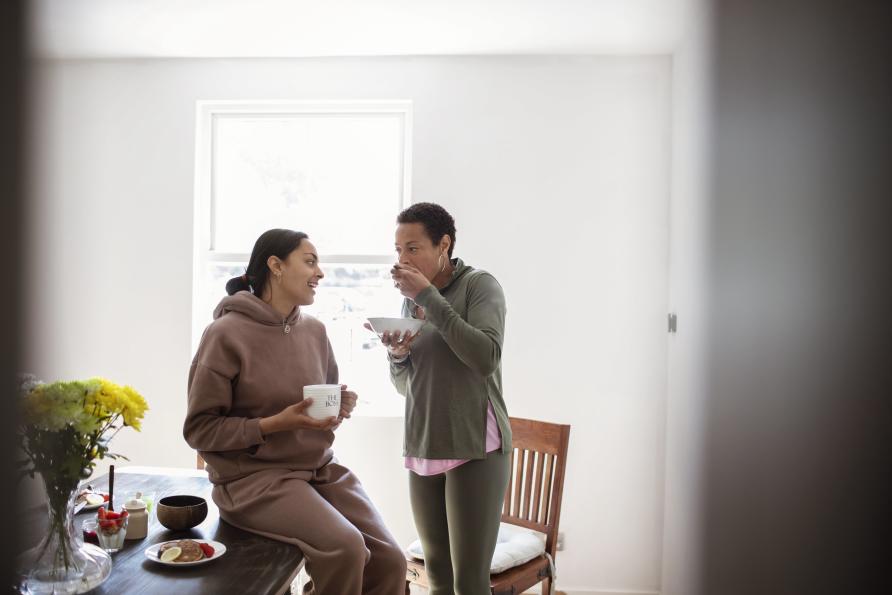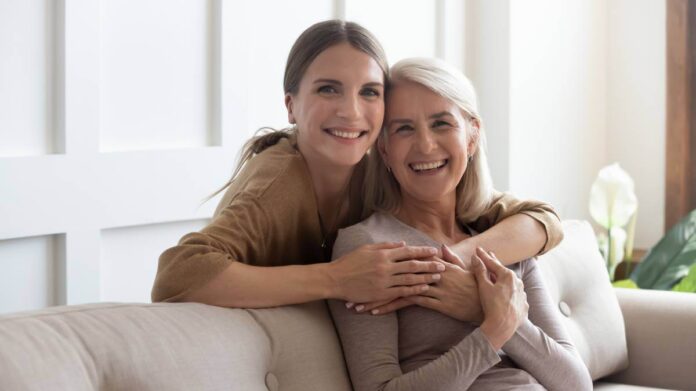Professor Lyn Craig and Professor Roger Wilkins
Australia’s young adults are putting their traditional steps towards adulthood on hold – spending more time living in the parental home.
In fact, just over half of young men (54 per cent) and 47 per cent of young women aged 18 to 29 years old are still living under the same roof as their parents.

There are a number of factors preventing young Australians from gaining their first foothold on the property ladder – many young Aussies are taking longer to find their feet in the workforce, incomes are falling and cost-of-living is going up.
The latest Household, Income and Labour Dynamics in Australia (HILDA) Survey finds this ‘seismic shift’ in the nature of Australian households that began in the early 2000s is continuing, says Professor Roger Wilkins, deputy director of the Melbourne Institute: Applied Economic & Social Research and HILDA Survey co-director.
“The social and economic forces that have driven an increase in the number of young adults living with their parents are still present,” he says.
“We’ve seen a rise in higher education participation, declining full-time employment opportunities for young people, a rising cost in housing, and a trend towards later marriage and family formation.
“The traditional markers of adulthood are happening later in life now.”
The HILDA Survey follows the lives of more than 17,000 Australians each year, over the course of their lifetime, collecting information on many aspects of life in Australia, including household and family relationships, income and employment, and health and education.
A narrowing gap
The latest HILDA data was collected in 2021 and found a slight bump in the number of 26- to 29-year-olds living with parents during the first year of the COVID-19 pandemic.
This was mostly due to fewer Australians in that age group deciding to leave home.

The data also shows that the gap between the number of young men and women living out of the parental home is narrowing. In 2001, 47 per cent of men and 36 per cent of women aged 18 to 29 years lived with their parents.
In 2021, that 11 per cent difference narrowed to 8 per cent.
HILDA finds men in Victoria, South Australia and New South Wales are more likely to live with their parents than men in other states and territories. Meanwhile, women in Victoria, Queensland and South Australia are less likely to live with their parents – although the reasons for these patterns aren’t clear.
Men employed full time are less likely to live with their parents, but women who work part time are more likely to live in the family home than unemployed women. Again, the reasons for these differences are not known.
Who’s doing the housework?
What is the impact of a ‘full nest’, rather than an ‘empty nest’, on family dynamics?
Lyn Craig, professor of sociology and social policy, says, in short, this living situation generally means more housework for mum.
“Compared to young adults living alone or in a share house, those living with parents are much less likely to do the same amount of domestic labour.

“Parents living with young adults do more housework. This living arrangement doesn’t turn into a flatmate situation, it typically creates more housework for mum,” says Prof. Craig.
Maybe baby …
More importantly, she highlights a more serious implication for young people who are living at home for longer – whether by choice or because they cannot afford to live independently.
“While we are living longer so we have time to stretch out and slow events and transitions during our life course – one thing we can’t really slow is fertility.
“So, there may be implications for young people being able to embark on the great adventure of parenthood,” says Prof. Craig.
“Since the mid-20-teens, fertility has fallen below replacement in Australia for the first time and I think that has something to do with the price of housing and young people not being able to afford to establish an independent household away from parents.”
Living at home … in Europe
In some parts of the world, it is common for adult children to remain at home for longer.
A Eurostat report found that in the EU in 2021, males left the parental household at an average age of 27.4 years and females at 25.5 years.

Men left the parental home after the age of 30 in 11 EU countries — Croatia, Portugal, Slovakia, Bulgaria, Greece, Slovenia, Italy, Malta, Spain, Romania and Poland.
So is Australia heading the same way?
Having fun while they can
Prof. Wilkins and Prof. Craig believe the delay in young people taking traditional steps towards adulthood shouldn’t be viewed solely through a negative lens.
“Some young people would like to start their adulthood journey and to have their own home but Australia’s economic conditions aren’t allowing that.
“Policy action to make housing more affordable and to increase housing supply is a clear way to tackle that,” says Prof. Wilkins.
“On the positive side, as a richer society with longer life expectancy, perhaps some young people are making a rational and conscious choice to delay getting into the hard yakka of life.
“They decide to enjoy themselves and have some fun while they are still young.
“As a whole, baby boomer parents are also a relatively wealthy cohort, so their capacity and preparedness to house their kids into adulthood has increased. Perhaps it’s not the imposition it once was on parents who were more constrained economically.”

Subsidising and stepping in
Prof. Craig says accommodating adult children at home is one way in which families today are providing financial support to children who are struggling to gain a financial foothold.
If the bank of mum and dad can’t stretch to providing a loan or deposit for a first home, then subsidising adult children to live at home at no or low cost while they try to establish themselves is something many parents are happy to do.
“The adaptation of families is impressive,” she says.
“Whatever families do and whatever situation they face, many of them step in and do good things for each other.
“Adult children staying at home longer may come with some strains, but it can also solve some problems.”
Did your children move back in? Why not share your experience in the comments section below?
Also read: How to handle money issues when grown up kids live at home


There is only one child I raised still at home because she is still completing high school.
The other eight all moved out at various ages between eighteen and twenty five but some kept returning for a stint at home from time to time.
We have two empty bedrooms right now which are always available to them if needed.
My son and his family have moved in to the family home where he was raised, and where I still live. This was to benefit both sides, my health is failing and I no longer could maintain a 4 bedroom house. And they were paying exorbitant rent and felt they would never save enough to buy a house. Our solution was to put a granny flat on the property for me and they would have the house. The builder of my granny flat says they are seeing a lot of similar situations with clients. I see a change coming that aligns with what already happens in many countries, property is tightly held within families and passed on instead of being sold when parents get older. This could create a have and have-not situation for a lot of the younger population, where some will benefit from inheriting property and others will become permanent renters.